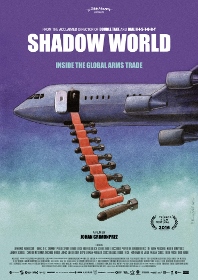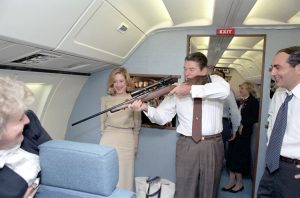SHADOW DOCUMENTARY
Johan Grimonprez’s documentary, based on Andrew Feinstein’s 2011 book The Shadow World: Inside the Global Arms Trade, attempts to delve into the murky relationships between politicians and arms manufacturers, proposing that the former are mere representatives of the latter, and that to a great extent war is a manufactured, for-profit enterprise. We get to see a broad array of file footage, from WWI films to shots taken of the Earth from outer space. There’s a memorable clip of George W. Bush ducking two shoes thrown at him by an angry Iraqi at a news conference. And one of Donald Rumsfeld with a mystified expression on his face when he’s confronted with footage of himself exchanging friendly handshakes with Saddam Hussein. We also get a generous portion of talking heads ’” an international arms dealer, The New Yorker’s Seymour Hersh, former The New York Times war correspondent Chris Hedges, retired U.S. Army Colonel Lawrence Wilkerson, who served under Colin Powell.
We get bits about Iran-Contra, the coup in Chile, Halliburton, bribes paid to officials in the forms of commissions by arms manufacturers, the lies behind the “intelligence” Powell shared at the U.N. during his anthrax speech, a multi-billion dollar arms deal with Saudi Arabia brokered by Tony Blair. Yet for all the effort and good intentions that went into making Shadow World, in the end it comes off as a sentimental, agenda-driven, at times hysterical and schizophrenic tangle of story threads and incomplete bits of information. No issue is truly explored. Narratives are started then abandoned for new ones, many of which have only a vague connection to the film’s central thesis; facts are mixed with conjecture and opinions, and events aren’t put into sufficient perspective.
A white American woman screams at Obama during a press conference, accusing him of killing an innocent 16-year-old Muslim boy with a drone strike. The incident has layers worth exploring. But Mr. Grimonprez is only interested in using it as an example of an outcry against anonymous military violence. And so while cinematically Shadow World can be improved with editing, it is the attitude of this film that is most problematic. With so much information out there it’s impossible for a lay individual to sort through it all and separate the truth from the lies. We have to trust someone else to do it for us. But how do we know if this entity is trustworthy? One way is its reputation, which may or may not be accessible. The other is to look carefully at how they are telling their story. A false story will never sound true if one listens carefully enough to the way it’s being told. Unfortunately, a true story can sound suspect when presented poorly, making it impossible for us to determine if what we are being told is accurate or not. This is why it’s essential for, let’s say, the good guys, to tell their stories well. Telling the truth is not enough, the truth has to also seem true. Otherwise it all looks like the same propaganda, whether its author is Michael Moore or Karl Rove.
photos © Courtesy of Tribeca Film Festival
Shadow World
Widehouse presents a Dillywood and Louverture Films production
USA / Belgium / Denmark | 2016 | Color | 94 min.
World Premiere at Tribeca Film Festival
for screening times, visit Tribeca
for more info, visit Shadow World





